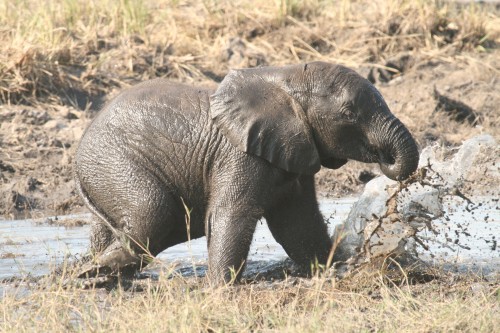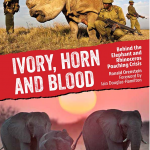
The horrific story from Zimbabwe that baby elephants were snatched from their mothers and sent to zoos in China and/or the UAE has elicited a statement from the Secretariat of the Convention on International Trade in Endangered Species of Wild Fauna and Flora (CITES).
In response to receiving “copies of various news articles, as well as other communications by private individuals and special interest groups”, the Secretariat explained that the issuance of permits and certificates is done by national CITES authorities, not by the Secretariat. This means that, in this case, it is up to Zimbabwe, China and/or the UAE — not the Secretariat — to issue appropriate permits for trade in live elephants. In other words, CITES is not an enforcement agency — it’s an international agreement signed by 180 member Parties. Thus, it is up to signatories to implement the Convention at a national level.
Trade in live #elephants from Zimbabwe – public statement of the CITES Secretariat http://t.co/6jra4E99mg pic.twitter.com/kD4FSBTjAB
— CITES (@CITESconvention) December 18, 2014
Zimbabwe’s elephant population is listed on CITES Appendix II which does allow for “trade in live animals to appropriate and acceptable destinations”. (Resolution Conf. 11.20 — “destinations where the Scientific Authority of the State of import is satisfied that the proposed recipient of a living specimen is suitably equipped to house and care for it”.) Additionally, before granting a permit, the CITES Management Authority of Zimbabwe is responsible for ensuring that the export will not be detrimental to the survival of the species that the animal will be shipped so “the risk of injury, damage to health or cruel treatment” are minimized (Article IV of the Convention).
The Secretariat contacted the relevant CITES Management Authorities, and it seems part of the widely reported story was verified. Although no application has been received by the China CITES MA to import elephants from Zimbabwe, permits to import seven elephants into the UAE from Zimbabwe have been issued.
“The Secretariat has corresponded with the CITES Management Authorities of China, the United Arab Emirates and Zimbabwe to ascertain the particular circumstances surrounding the reported trade in live elephants. The Secretariat has also asked whether the procedures set out under Article IV of the Convention and Resolutions Conf. 10.21 (Rev. CoP16) and Conf. 11.20 were followed in relation to any trade.”
According to the Secretariat, “the CITES Management Authority of China has advised that it has not received any application to import elephants from Zimbabwe”.
However, the CITES Management Authorities of Zimbabwe and the UAE informed the Secretariat that they have authorized the export of “seven elephants as a family group that has been in captivity in Zimbabwe for more than 10 years”.
“The Management Authority of Zimbabwe has also advised that before the trade was authorized, a non-detriment finding was made in Zimbabwe. The authorities of both the United Arab Emirates and Zimbabwe advise that they conducted an inspection of the private park to which the animals will be sent, to ensure that it is an appropriate and acceptable destination.”
The CITES Secretariat says it requested, and now has copies of the inspection of the private park and the permits.
On December 16, the National.ae reported that the UAE’s Ministry of Environment and Water confirmed that seven elephants (a “family group” which includes a mother and calf) which had been living in captivity were indeed expected to arrive in the UAE. No details were provided regarding the captive location. The ministry denied claims that it had ordered “34 baby elephants, seven lion cubs and 10 rare sable antelope” from Zimbabwe.
Read the full statement from the CITES Secretariat: Trade in live elephants from Zimbabwe – Public statement of the CITES Secretariat.




